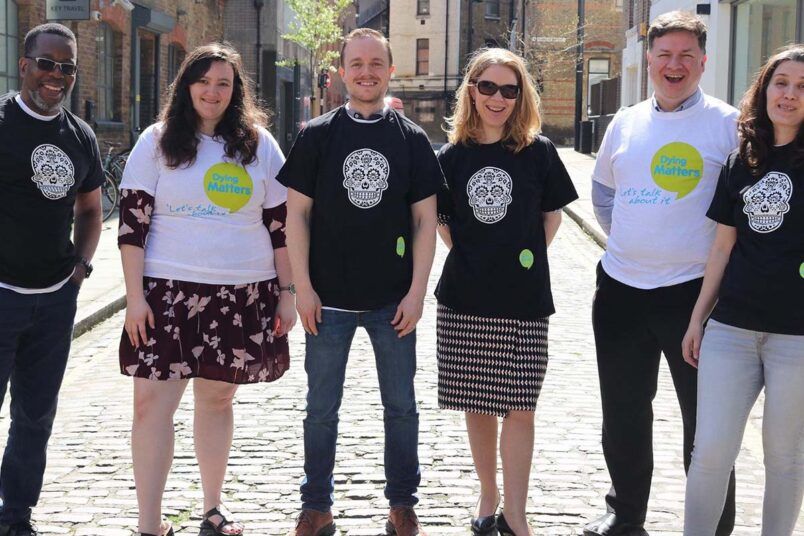
Are we ready to talk about death? And if not, then what?

Dying Matters Awareness Week is nearly here. It runs for the 10th time from May 13th–19th, and there are already hundreds of events registered, and more coming in every day.
Since the first Awareness Week in 2010, Dying Matters has been about two parallel asks:
First, we should all be more comfortable talking about dying, death and grief.
Second, we should all do five things:
- plan our funeral
- write our will
- decide on organ donation
- plan our end of life care
- Most importantly — write these down and tell others where to find the information
The two threads support each other: it’s easier to do the practical stuff if we’re comfortable talking about death; and discussing your funeral, will and the rest is a good way of starting wider conversations about dying.
Our theme for this year
The 2019 theme is “Are We Ready?” It’s deliberately asking if we are ready — death, and preparing for it, shouldn’t be something anyone should have to face alone unless they wish it.
And we know that many people will answer “No” or “I don’t know.” That’s fine — the first step to being ready for death is working out what steps are necessary to be ready, and those will be different for everyone.
Everyone starts in a different place, and how we think about death — or if we think about death — will vary.
So we’ve been encouraging people to talk about death, dying and bereavement for nine years, and thousands of events involving many tens of thousands of people have taken place across the country. Each of these is organised and run locally, and there are as many different ideas as there are people organising them. What they have in common is they create a space where it’s OK to talk about death. Some are practically focused — will writing clinics, or tours of the local funeral director — while others are more existential, for example Death Cafes, or theatre pieces.
Create the space where death and grief are on the agenda, and people will come and they will talk.
Some have questions, some have worries or fears, some want to share their experiences. Once these conversations start, it can be hard to make them stop. Death is such a taboo subject that once you do give it the green light a lot of feelings, and a lot of laughter, come flooding out.
What about the people who aren’t ready to talk?
There are many reasons why someone doesn’t want to talk about death. They might be still coping with bereavement, or just find it upsetting, or have concerns they feel others won’t understand. Or they just might feel it’s a topic for another day.
According to a 2015 poll, over 1/3 of over-65s think death is still a long way off. Why spoil a lovely day with such a gloomy topic?
Back when I started with Dying Matters, that attitude would have produced some finger-wagging on my part. Don’t you know that talking about death won’t make it happen? It’s important we all face it — after all, we’re all going to die someday.
Now I understand better. Yes, it is important to talk about it, and to get those practical matters sorted out. But there’s an emotional cost associated with talking about dying: even though it’s essential, it’s also often hard. I can’t blame people for feeling they’d rather talk about something else. It’s literally my job to talk about death, and there are days when I’d rather do anything but.
This doesn’t let you, or me, or any of us off the hook. We’re all going to have to deal with death sometime, and this will be easier to cope with if we have people we can talk to about it. But it means we need to be open to the prompts that might get the conversation started: the occasions when someone is ready to talk about death are rarer than we’d like, and that makes them more important.
Crucially, it means that the least we owe each other is to be the other half of a conversation when a friend or relation is ready to talk, because they might not be ready to talk about death tomorrow or next week.
This might be the only point when they are ready, and we must not shut that conversation down when it happens. We might not like it, and we might not be ready to initiate that talk ourselves, but when someone we know wants to talk about death, we have to be part of that. It isn’t easy, but it is important.
Are we ready?
If you have an idea for a blog you’d like to write, let us know — either via Twitter or email.